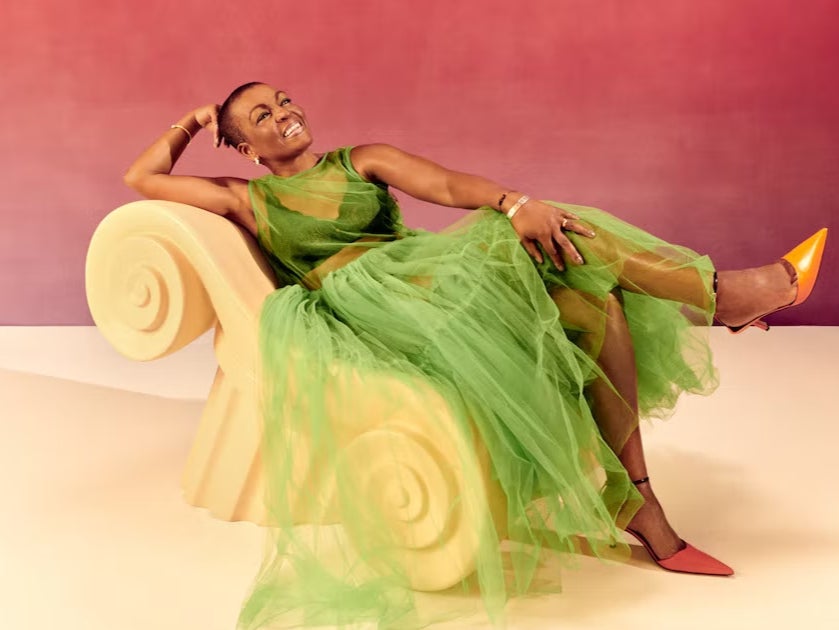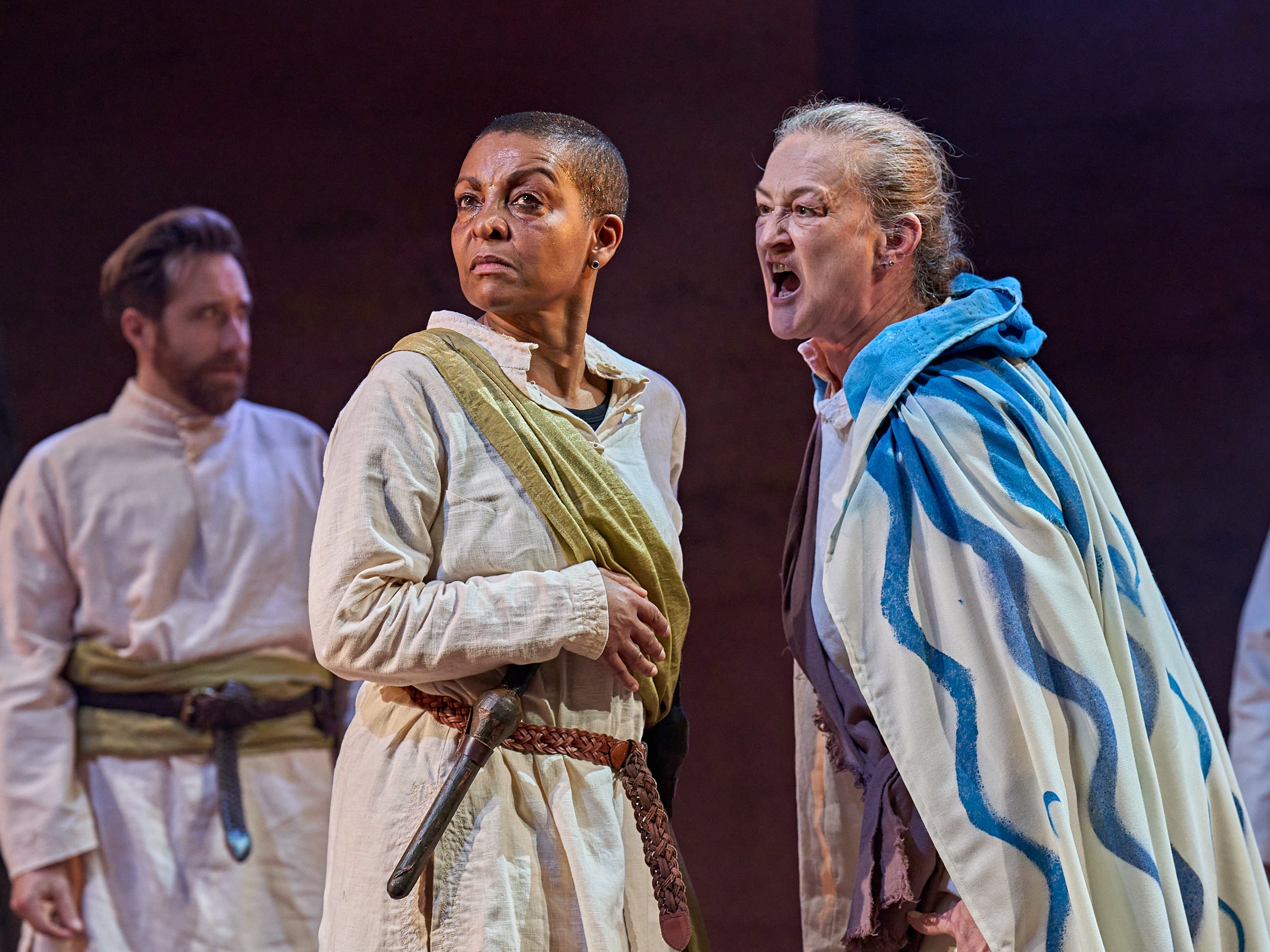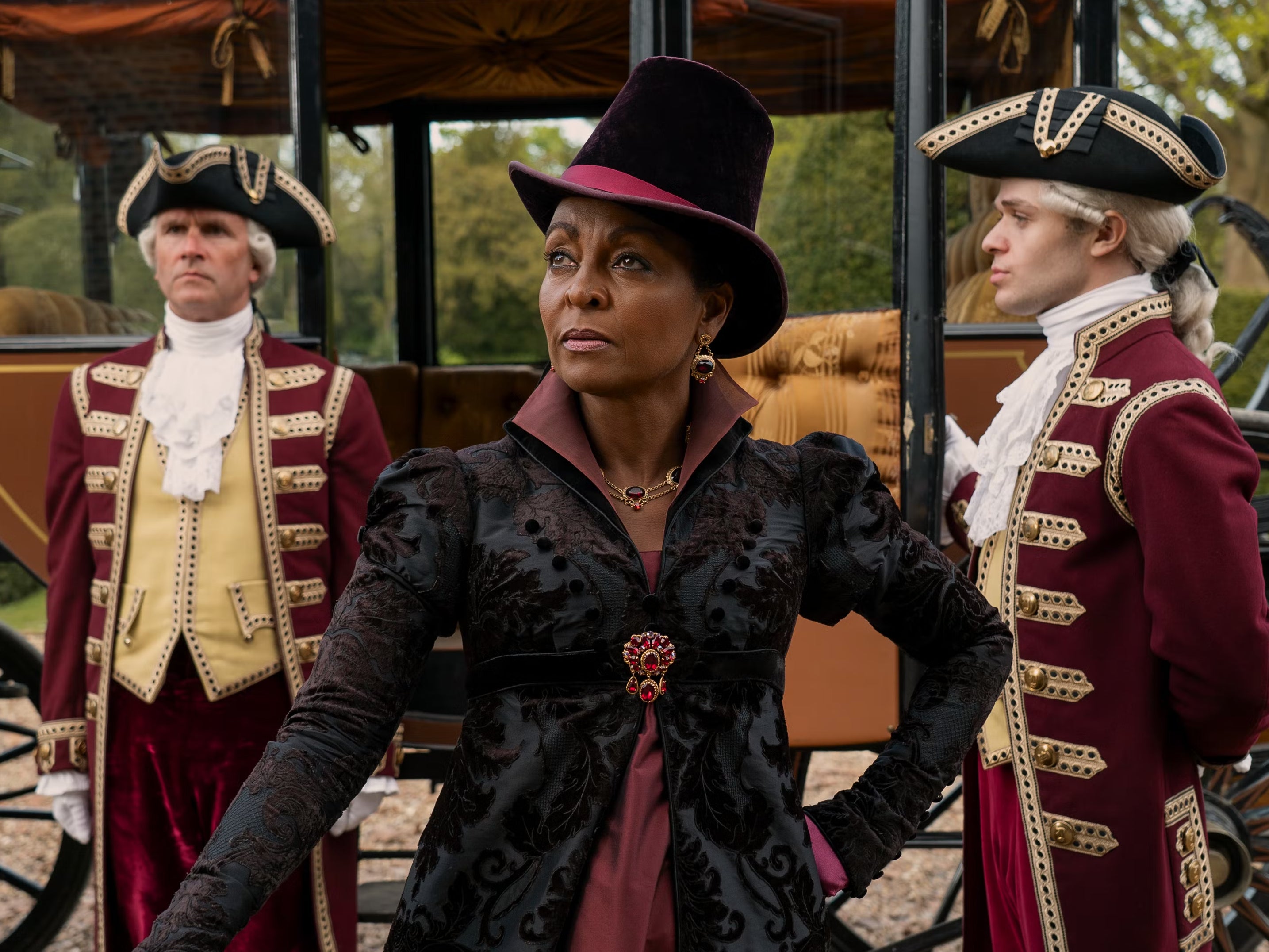Queen Charlotte’s Adjoa Andoh: ‘I’m vibrant, sexual, have appetite – why would my stories not be interesting?’
The ’Bridgerton’ actor talks to Isobel Lewis about Netflix’s ‘Queen Charlotte’, getting older and intimacy coordinators


Adjoa Andoh knows her history. The Bridgerton star is the daughter of a history teacher, and a self-proclaimed “anorak” on the subject; she has spent her entire life fascinated by the lives of her family, her hometown, and our society. There’s the history of her father, a free-thinking journalist who left Ghana’s biggest daily newspaper for the UK rather than toe the party line in a dictatorship; there’s the great-uncle who lost his arm in the Second World War. And then there’s the story of people of colour in Britain, who have often been “written out” of official histories. “As we all know,” she tells me, “history is written by the winners.” Still, Andoh is quick to correct me when I call her a history buff. “Not buff. Anorak. I claim no expertise whatsoever. I’m just a bit dweeby about it all.”
This small exchange is revealing. There’s a certainty to Andoh about who she is and what she thinks. She’s passionate and engaging – not preachy (although she is licensed as a lay reader in the Church of England) but concrete in her opinions. She’s in Liverpool, moving her camera to show me a view of the Mersey. There’s a historical connection here, too: her grandfather ran away to these very docks from his family of tenant farmers when he was a teenager. She chose this hotel room especially. “I like to sit here and think of that little 15-year-old boy making courageous choices for his life, and think about where our family has gone in the world, and how we all are,” she says.
The 60-year-old’s hair is closely cropped and she sports a Leeds United tracksuit; she’s a committed fan and has been“weeping quietly”, following a catastrophic loss for her team just days before. She looks worlds away from the high society of Regency England, where many fans will know her as the sharp-tongued Lady Danbury in Netflix’s historical hit. Yet before she donned an empire-waist gown – something she’s now doing again for spin-off series Queen Charlotte: A Bridgerton Story – Andoh spent the previous three decades carving out a rich career on screen and stage, from Oscar-nominated films (2009’s Invictus) to Saturday night TV (Casualty and Doctor Who) to Shakespeare (she’s currently directing and starring in Richard III).
The latter project sees Andoh return to her roots, with the production set in a small Gloucestershire village – just like the one she grew up in. Andoh was born in neighbouring Bristol, with her father moving the family to the Cotswolds in hope of giving his children a better education. When I mention my own childhood in an (even tinier) nearby village, she is quick to tell me about the area’s history: both broad and personal.
“Trust me, the Sixties and Seventies in the Cotswolds were like the 1940s and 50s for the rest of the nation,” she says. On the one hand, Laurie Lee’s bucolic tale Cider with Rosie could have been “a documentary of my childhood”, Andoh living her younger years in “complete freedom”. The days were spent picking blackberries, scrumping apples, climbing trees, hitchhiking. “You had to take care of yourself [as] children. You knew where to avoid and you knew where you were safe, and I love the fact that that was my childhood.”
But the freedom of this rural arcadia was disturbed by harsher social realities pressing in. The Andohs were the only family of colour that Adjoa knew when she went to secondary school, although “there was one Chinese family that ran the chip shop in the next big town (there were 4,000 people there, it was a big town)... You had to deal with the consequences of being that othered child from some parts of the community.”
You can see, then, why Andoh was so drawn to Queen Charlotte, a show centred around the similarly othered young monarch. As in Bridgerton, the spin-off follows the adult Charlotte (Golda Rosheuvel) as she rules over genteel society with poise and many a sarcastic eye-roll. But the mini-series also transports fans back to her teenage years to meet the young German royal (India Amarteifio), who arrives in England to marry the handsome yet mysterious George III (Corey Mylchreest).
In Queen Charlotte, the royal is described as “the first of her kind”, brought to England to “unite” the country. Others, meanwhile, whisper that the marriage between Charlotte and George is bringing about an “unnatural society”. The real-life Charlotte of Mecklenburg-Strelitz’s racial identity has long been debated by historians, some of whom insist she was white, while others call her Britain’s first Black queen. “When she arrived in this country, there was a huge furore about this woman who was ‘mulatto’ in appearance with her ‘wide nose and her ‘ugly thick lips’, and there was great consternation,” Andoh says. “So Shonda has done that brilliant thing of going, ‘Well, how did they deal with that? How did the royal family of Hanover here deal with that? How would Charlotte possibly have dealt with it? How would George have dealt with it? What would have happened?”

Andoh refutes the claim that Bridgerton is inaccurate for depicting Regency England as not entirely white; really, she says, it’s the show’s critics’ knowledge that’s “ahistorical”. “There were people of colour at all levels of society,” she said recently. “People came from royal kingdoms to educate their children in this country, you know, stuff went backwards and forwards at all levels, from royalty down to slavery.” Still, Bridgerton is “not a history lesson” – nor does it pretend to be. This is made clear in the opening seconds of Queen Charlotte, which features a tongue-in-cheek version of the kind of disclaimer that Tory MPs (and Judi Dench) insisted should precede episodes of The Crown. “[The show] is fiction inspired by fact,” it reads. “All liberties taken by the author are quite intentional.”

Watch Apple TV+ free for 7 day
New subscribers only. £9.99/mo. after free trial. Plan auto-renews until cancelled.
ADVERTISEMENT. If you sign up to this service we will earn commission. This revenue helps to fund journalism across The Independent.

Watch Apple TV+ free for 7 day
New subscribers only. £9.99/mo. after free trial. Plan auto-renews until cancelled.
ADVERTISEMENT. If you sign up to this service we will earn commission. This revenue helps to fund journalism across The Independent.
Trust me, the Sixties and Seventies in the Cotswolds were like the 1940s and 50s for the rest of the nation
Bridgerton arrived in Christmas 2020, providing some much-needed glamour to a time most of us would rather not look back on, thank you very much. It smashed records for Netflix, with audiences enthralled by the romance, the costumes, and, of course, the sex scenes. Like Normal People eight months earlier, Bridgerton was one of the first shows to consistently use intimacy coordinators. It felt like a shift had occurred in the industry. Looking back on the nude and sex scenes from her own career, Andoh describes them as “collaborative” and meticulously choreographed, but with a definite sense that “you just sort of dived in and got on with it”. She explains: “It’s always been very pragmatic, there’s been nothing salacious in it… but I know that’s not everybody’s experience.”
In those scenes, Andoh says, she always hoped that “what we recreated has had the throb and the intimacy that you would want to be communicating to an audience”, while the actors still felt safe. I mention the pushback from certain people within the industry (often older male actors) who have argued that too much planning of sex scenes takes away any spontaneity or spark. “But maybe one person’s spark is someone else’s discomfort, right?” she says. “I know when I first encountered it, I was a bit like, ‘We just get on with it’ and then I was like, ‘No, come on, think how you can use this’... I think people might say, ‘Well it takes away the spontaneity,’ but we’re all acting in a space. There’s usually a load of crew, there are cameras, there are lights; it’s not spontaneous anyway!” The actor’s skill, she says, is seeing the parameters and using them to find more freedom, not less, adding: “Us older curmudgeons have to step up.”

Having turned 60 earlier this year, Andoh has been thinking a lot about society’s “ancient” attitude towards ageing. She’s seen women dismissed on and off screen as soon as they hit menopause, while “a man can be a silver fox and it’s, ‘OK baby’”. She sighs. “It’s taken a huge heave-ho from women, predominantly, to just go, ‘Actually, I’m not pushing out babies, but I may still have another 40 or 50 years of life left to go. I’m vibrant, interesting, sexual, have appetite, have experience, all that good stuff. Why would my stories not be interesting?’”
It’s mostly frustrating, Andoh says, because she has so much more to give. She points to her parents; her 90-year-old father who still sings in his local choir, and her mum who, in her eighties, still volunteers. “Actually, there’s a complexity as you get older to how your life is that’s just not there when you’re younger,” she says. “You have things that tweak you and things that haunt you and things that catch up with you and things you want to avoid and things you want to embrace in a way that you can’t have if you’ve only been on the earth for 30 years.” For now, she wants to keep telling those stories. “Let us see ourselves, let us hear about ourselves, let us read about ourselves,” she says, a rallying cry. “Come on!”
‘Queen Charlotte’ is available to stream on Netflix now
Join our commenting forum
Join thought-provoking conversations, follow other Independent readers and see their replies
Comments


Bookmark popover
Removed from bookmarks